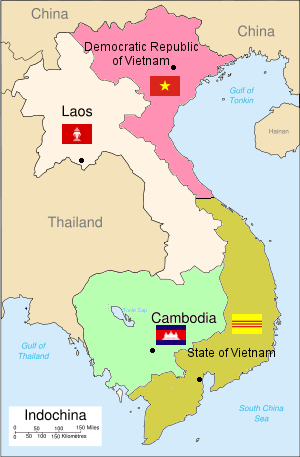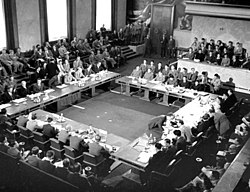1954 Geneva Conference
All parties involved agreed to this (Ho Chi Minh had strong support in the north, which was more populous than the south, and was thus confident that he would win an election), except for the U.S., which, in the spirit of the Cold War, feared seeing communism spreading in a domino effect throughout Asia as written in a National Intelligence Estimate dated 3 August 1954.On June 15, the last day of the conference on the Korean question, the USSR and China both submitted declarations in support of a unified, democratic, independent Korea, saying that negotiations to that end should resume at an appropriate time.Georges Bidault, leading the French delegation, vacillated and was keen to preserve something of France's position in Indochina to justify past sacrifices, even as the nation's military situation deteriorated.[4]: 550–51 Bidault opened the conference on 8 May by proposing a cessation of hostilities, a ceasefire in place, a release of prisoners of war, and a disarming of irregulars, despite the French surrender at Dien Bien Phu the previous day in northwestern Vietnam.[10] Following their victory at Dien Bien Phu and given the worsening French security position around the Red River Delta, a ceasefire and partition would not appear to have been in the interests of the DRV.[4]: 563–66 By 29 May, the U.S. and the French had reached an agreement that if the Conference failed to deliver an acceptable peace deal, Eisenhower would seek Congressional approval for military intervention in Indochina.On 18 June, Pham Van Dong said the Viet Minh would be prepared to withdraw their forces from Laos and Cambodia if no foreign bases were established in Indochina.[4]: 581 The apparent softening of the Communist position appeared to arise from a meeting among the DRV, Chinese and Soviet delegations on 15 June in which Zhou warned the Viet Minh that its military presence in Laos and Cambodia threatened to undermine negotiations in relation to Vietnam.General Paul Ély outlined the deteriorating military position in Vietnam, and Jean Chauvel [fr] suggested that the situation on the ground called for partition at the 16th or 17th parallel.[4]: 585–87 On 16 June, twelve days after France granted full independence to the State of Vietnam,[14] Bao Dai appointed Ngo Dinh Diem as Prime Minister to replace Bửu Lộc."[15] On 28 June following an Anglo-US summit in Washington, the UK and the U.S. issued a joint communique, which included a statement that if the Conference failed, "the international situation will be seriously aggravated."She retained a superiority in numbers—some 470,000 troops, roughly half of them Vietnamese, versus 310,000 on the Viet Minh side as well as control of Vietnam's major cities (Hanoi, Saigon, Huế, Tourane (Da Nang)).A fundamental alteration of the balance of forces had thus yet to occur, Giap continued, despite Dien Bien Phu.Wei Guoqing, the chief Chinese military adviser to the Viet Minh, said he agreed.Given Washington's intense hostility to the Chinese Revolution ... one must assume that the current administration would not stand idly by if the Viet Minh sought to win complete victory."Ho Chi Minh and General Secretary Trường Chinh took turns Emphasizing the need for an early political settlement to prevent military intervention by the United States, now the "main and direct enemy" of Vietnam.A demarcation line allowing the temporary regrouping of both sides would be necessary ..." The plenum endorsed Ho's analysis, passing a resolution supporting a compromise settlement to end the fighting.However, Ho and Truong Chinh plainly worried that following such an agreement in Geneva, there would be internal discontent and "leftist deviation", and in particular, analysts would fail to see the complexity of the situation and underestimate the power of the American and French adversaries.They accordingly reminded their colleagues that France would retain control of a large part of the country and that people living in the area might be confused, alienated, and vulnerable to enemy manipulations.[16] Based on a proposal by Zhou Enlai, an International Control Commission (ICC) chaired by India, with Canada and Poland as members, was placed in charge of supervising the ceasefire.Bedell Smith delivered a "unilateral declaration" of the U.S. position, reiterating: "We shall seek to achieve unity through free elections supervised by the United Nations to insure that they are conducted fairly.Despite retaining its monarchy, the agreement also allowed for "VWP-affiliated Laotian forces" to run the provinces of Sam Neua and Phongsal, further expanding North Vietnamese influence within Indochina.Bidault had stated at the beginning of the Conference that he was playing with "a two of clubs and a three of diamonds" whereas the DRV had several aces, kings, and queens,[4]: 607 but Jean Chauvel was more circumspect: "There is no good end to a bad business."[4]: 613 In a press conference on 21 July, US President Eisenhower expressed satisfaction that a ceasefire had been concluded but stated that the U.S. was not a party to the Accords or bound by them, as they contained provisions that his administration could not support.[4]: 612 On 9 October 1954, the tricolore was lowered for the last time at the Hanoi Citadel and the last French Union forces left the city, crossing the Paul Doumer Bridge on their way to Haiphong for embarkation.North Vietnamese, especially Catholics, intellectuals, business people, land owners, anti-communist democrats, and members of the middle class moved south of the Accords-mandated ceasefire line during Operation Passage to Freedom.The ICC reported that at least 892,876 North Vietnamese were processed through official refugee stations, while journalists recounted that as many as 2 million more might have fled had it not been for the presence of Viet Minh soldiers, who frequently beat and occasionally killed those who refused to turn back.Historian John Lewis Gaddis said that the 1954 accords "were so hastily drafted and ambiguously worded that, from the standpoint of international law, it makes little sense to speak of violations from either side".



Geneva ConferenceFrench Indochinasuccessor statesKingdom of CambodiaKingdom of LaosDemocratic Republic of VietnamHo Chi MinhViet MinhState of VietnamKorean WarFirst Indochina WarGenevaSwitzerlandKoreanFrench colonial empireSoutheast AsiaRepublic of VietnamSouth KoreaNorth KoreaPeople's Republic of ChinaSoviet UnionUnited StatesFranceUnited KingdomNguyễn dynastyBảo ĐạiNgo Dinh DiemVietnam WarBerlin ConferencePalace of NationsKorean Armistice Agreementguerrilla warBattle of Dien Bien Phu17th parallelCold Wardomino effectChinese forcesUN forcesAnthony EdenGeorges BidaultEisenhower administrationTruman administrationlost Chinasecuring controlconsidered air strikesWalter LippmannSecretary of StateJohn Foster DullesZhou EnlaiWalter Bedell SmithPhạm Văn Đồngthe Democratic Republic of VietnamPathet LaoKhmer IssarakRed River DeltaRobert F. TurnerCà Mau PeninsulaSaigonTonkinHaiphongMatthew RidgwayVyacheslav Molotovnon-alignedLaniel governmentRadicalPierre Mendès FranceNational AssemblyPaul ÉlyBửu LộcTran Van Do13th parallelLiuzhouTouraneWei GuoqingChinese RevolutionRoute 9Communist Party of VietnamSixth Central CommitteeTrường ChinhInternational Control CommissionPolanddemilitarized zoneInternational Supervisory Commissiontheir diplomatic relationsOperation Passage to Freedom1955 State of Vietnam referendumtricoloreHanoi CitadelPaul Doumer BridgeUSS MontagueArmy of the Republic of VietnamVietnamese National ArmyNgô Đình DiệmFrench UnionNational Liberation FrontVietnam People's ArmyNorth Vietnamese ArmyJohn Lewis GaddisVietnamese reunification dayKorean conflictAvalon ProjectYale Law SchoolColumbia UniversitySt. Martin's PressVassar CollegeDial PressOxford University PressUnited NationsFadiman, AnneThe Spirit Catches You and You Fall DownCold War HistoryVirginia Journal of International LawHoover Institution PublicationsRoutledgeGreenwood PressWikisourceWoodrow Wilson International Center for ScholarsFrance–Asia relationsFrance–Vietnam relationsFrance–Thailand relationsFrance–China relationsCochinchinaCambodiaGuangzhouwanProvisional Central Government of VietnamFrench assistance to Nguyễn Ánh (1777–1820)